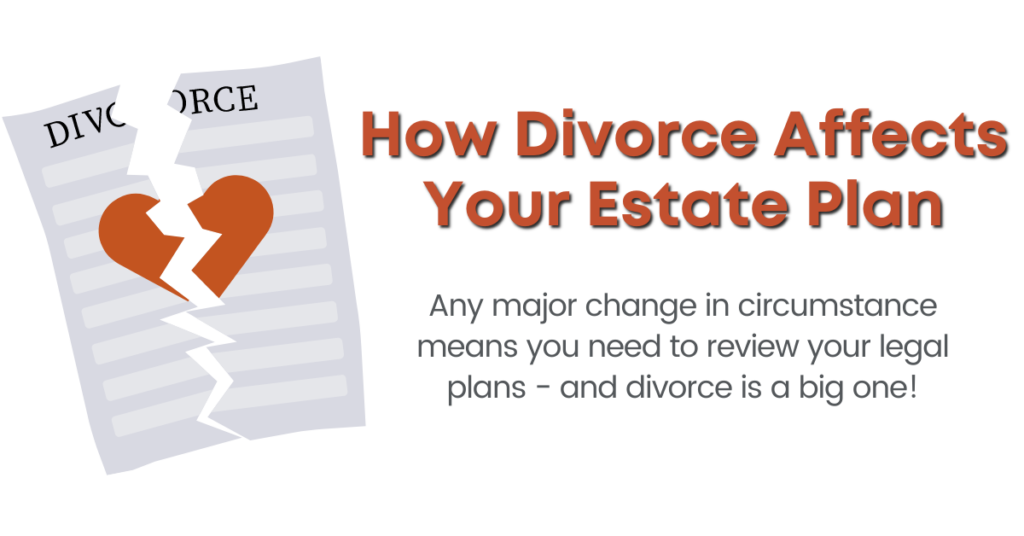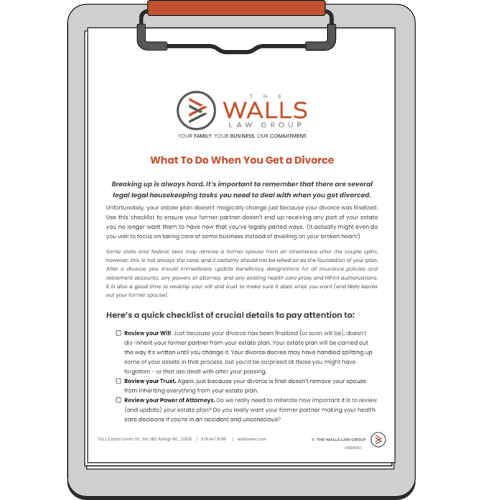
How Your Divorce Affects Estate Plans
After all the turmoil of a divorce, the last thing you probably want to hear, is a recommendation to schedule yet more meetings with an attorney. But because you have just gone through a major life change, it is essential that you meet with an estate planning attorney. Here are some of the reasons why.
Let’s start with the most obvious: Most married individuals designate his or her spouse as their primary beneficiary, and often name them as trustees or executors as well. Divorce does not automatically nullify these designations; in many cases, they’re still enforceable under the law. Although you are now divorced, you may still want your ex to inherit, be the trustee, etc., but we want you to make these decisions, knowingly, rather than leave them up to chance.
Of course, divorce has had a dramatic effect on your financial holdings and taxes. Estate planning (such as creation or revision of an existing trust) may be able to help reduce the new tax liability you may be facing. And because of that, estate planning is something you should not delay. Instead, consider it as a key ingredient in structuring your post-divorce assets.
For the recently divorced, perhaps the division of assets has made existing estate plans out of date. What if you had previously decided to will the house to your daughter, and the stock portfolio to your son? But you were required to sell the house during the divorce. Without a revised plan, your daughter will inherit nothing.
Additionally, if you had a joint estate plan, you and your ex-spouse may have decided on gifts to extended family, charitable entities or others that you may no longer want carried out. Now is the perfect time to review any existing wills and trusts to make sure your bequests are in keeping with your new priorities.
Even if you’ve been divorced for years, planning is vital to address how ongoing child support or alimony payments may impact your estate. We can assist you to ensure that your obligations are met regardless of what additional life changes you may experience.
For those of you with minor children, you may want to consider whether a new guardian will need to be designated. Without legal documents to the contrary, a biological parent will take sole custody of a child—rather than a preferred grandparent or a stepparent. There are also other issues (e.g., support, assets) you will need to address, in order to protect and provide for your minor children when you cannot.
Furthermore, there are small but crucial things that an estate planning attorney can help with: For example, we recommend that you name a decision maker for you, in the event of an emergency—for medical care and advance directives. You should consider giving someone limited powers of attorney for business or legal decisions—who can run the company, pay the bills and more—in the event that you are not able to.
It’s easy to think of divorce as cutting ties with the past. But you will benefit the most, if you also plan for the future.
Common Myths about Divorce & Estate Planning
Make sure you don't fall victim to these common myths about divorce & estate planning.
Myth: Since I am divorced, my ex-spouse will receive nothing if I die.
Myth: Since I am divorced, my ex-spouse no longer has any authority under a financial or medical power of attorney document.
Myth: I cannot update my will or trusts because I am paying child support or alimony.
Divorce FAQ
Frequently Asked Questions - common questions we hear from clients after a divorce.
The divorce took care of all the legal aspects I need to be concerned about...right?
Unfortunately - Wrong
Your divorce case may be final, but to be fully protected you must go through the estate planning process. Even if you created a plan while you were married, you are now a single person in the eyes of the law. Plus, the divorce decree may have divided the assets but it did not let you express who you want to leave them to now that you are no longer married.
Estate planning lets you decide who you want to leave your assets to.
What should I discuss with an estate planning attorney after my divorce?
Now that you are no longer married, your plans for your assets may be less clear than they once were. So, first explore who you would like to receive your estate. Second, be prepared to discuss who you want to handle your affairs when you are unable to do so. Third, make sure that you're living up to the terms required in your divorce decree regarding child support and alimony.
Do I have to get my ex-spouse’s consent to make a new will or trust?
Generally no.
Once you are divorced, you are treated as a single person for estate planning purposes. As a result, there’s no permission you need to change your will or revocable trust. Irrevocable trusts vary, depending on their purpose. If you have an irrevocable trust of any kind, bring a copy with you to your meeting and we can examine what options you have. If you have a contractual will (which is rare), you may need to discuss with your spouse or look at your divorce decree.






